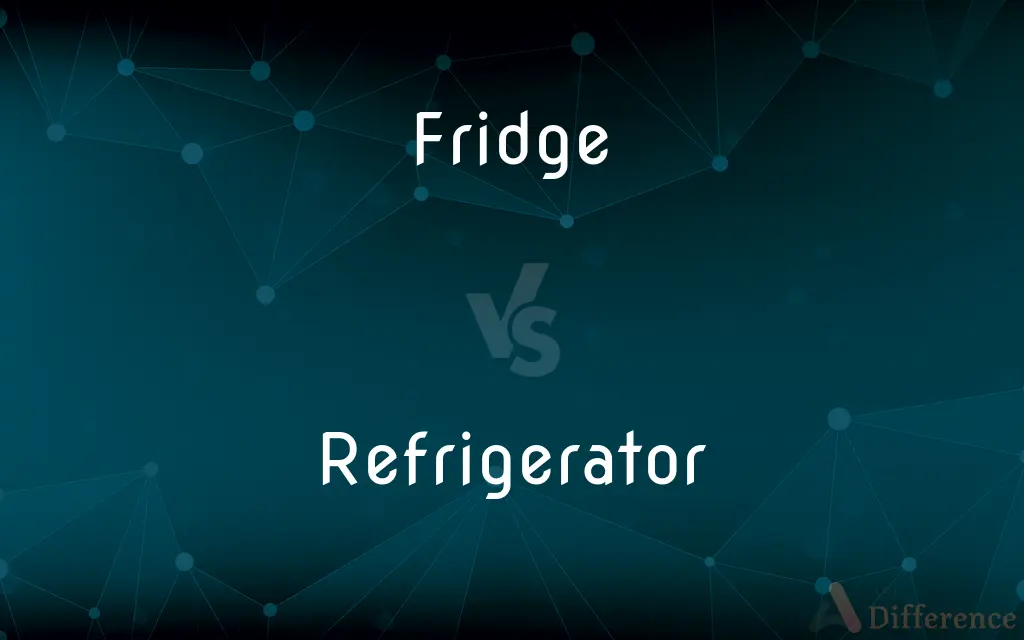Fridge vs. Refrigerator — What's the Difference?
Edited by Tayyaba Rehman — By Fiza Rafique — Updated on September 22, 2023
"Fridge" and "refrigerator" both refer to an electrical appliance used for storing food at low temperatures. "Fridge" is an informal, shortened term for "refrigerator," while "refrigerator" is the full, formal name for the appliance.

Difference Between Fridge and Refrigerator
Table of Contents
ADVERTISEMENT
Key Differences
The terms "fridge" and "refrigerator" both describe a home appliance used for preserving and storing food at low temperatures. "Refrigerator" is the complete, formal name, and it is commonly used in product descriptions, manuals, and technical documents. "Fridge," on the other hand, is the shortened, informal term that is widely used in everyday conversation.
When you are shopping for this appliance, salespeople and manufacturers are more likely to use the term "refrigerator." For example, the product specifications and warranty information would refer to the device as a "refrigerator." Meanwhile, in a casual setting, like when talking with friends or family, the term "fridge" is more frequently used. You would say something like, "I put the drinks in the fridge."
In terms of advertising and brand marketing, you'll often find the term "refrigerator" used to convey a sense of sophistication or to highlight specific features. "Fridge," on the other hand, appears in more casual marketing contexts or when brands are trying to create a relatable or friendly image. Both terms, however, are understood to refer to the same appliance and are interchangeable in most cases.
Linguistically speaking, "fridge" is an interesting term because, despite being a shortened version of "refrigerator," it adds a 'd' for phonetic convenience. "Refrigerator" doesn't contain a 'd,' but the term "fridge" includes it to make the word easier to say. Both words serve the same functional purpose but have nuanced differences in usage and formality.
Comparison Chart
Formality
Informal
Formal
ADVERTISEMENT
Common Usage
Everyday speech
Technical documents, sales
Phonetics
Contains a 'd'
No 'd'
Length
Shortened
Full form
Marketing
Relatable, friendly ads
Sophisticated, feature-focused ads
Compare with Definitions
Fridge
A fridge is an electrical appliance for storing food at low temperatures.
I put the leftovers in the fridge.
Refrigerator
A refrigerator is an electrical appliance designed to store food at low temperatures.
The refrigerator has adjustable shelves for better organization.
Fridge
A fridge often includes a freezer compartment.
The ice cream is in the fridge's freezer.
Refrigerator
Refrigerator is the formal name for the appliance commonly called a fridge.
This refrigerator comes with a warranty.
Fridge
Fridge is commonly used in casual conversations.
Can you grab a soda from the fridge?
Refrigerator
A refrigerator may have various compartments, including a freezer and crisper.
The refrigerator's crisper keeps fruits and vegetables fresh.
Fridge
Fridge is the informal term for a refrigerator.
My fridge broke down, and I had to call for repairs.
Refrigerator
The term refrigerator is commonly used in product descriptions and manuals.
Please refer to your refrigerator's manual for cleaning instructions.
Fridge
The term fridge includes a phonetic 'd' for ease of pronunciation.
It's easier to say fridge than refrigerator.
Refrigerator
Refrigerator does not contain a 'd,' unlike its informal counterpart "fridge."
The word refrigerator is a bit of a mouthful compared to fridge.
Fridge
A refrigerator
She put the carton of milk back in the fridge
Refrigerator
A refrigerator (colloquially fridge) is a home appliance consisting of a thermally insulated compartment and a heat pump (mechanical, electronic or chemical) that transfers heat from its inside to its external environment so that its inside is cooled to a temperature below the room temperature. Refrigeration is an essential food storage technique around the world.
Fridge
A refrigerator.
Refrigerator
An appliance or compartment which is artificially kept cool and used to store food and drink. Modern refrigerators generally make use of the cooling effect produced when a volatile liquid is forced to evaporate in a sealed system in which it can be condensed back to liquid outside the refrigerator.
Fridge
(informal) A refrigerator.
Refrigerator
An appliance, cabinet, or room for storing food or other substances at a low temperature.
Fridge
To place (something) inside a refrigerator to chill; to refrigerate.
Refrigerator
A household appliance used for keeping food fresh by refrigeration (short form fridge).
Fridge
To gratuitously kill, disempower, or otherwise remove (a character, usually female) from a narrative, often strictly to hurt another character (usually male) and motivate vengeance.
Refrigerator
A similar device used to keep non-food items cold, such as blood, photographic film, drugs, or pharmaceuticals like insulin.
Fridge
To chafe or rub (something).
Refrigerator
One who has a chilling influence.
Fridge
To chafe or rub.
Refrigerator
That which refrigerates or makes cold; that which keeps cool.
Fridge
Synonym of fidge
Refrigerator
White goods in which food can be stored at low temperatures
Fridge
To rub; to fray.
Fridge
A refrigerator in which the coolant is pumped around by an electric motor
Common Curiosities
What is a fridge?
A fridge is an electrical appliance used for storing food at low temperatures.
Is fridge the same as a refrigerator?
Yes, "fridge" is the informal term for "refrigerator."
Is fridge used in formal settings?
"Fridge" is generally not used in formal settings; "refrigerator" is preferred.
Are fridge and refrigerator interchangeable?
Yes, they are interchangeable, but the formality of the setting may dictate which term is more appropriate.
How did the term "fridge" originate?
"Fridge" is a shortened, informal version of "refrigerator."
Is it common to see "fridge" in advertising?
"Fridge" is often used in more casual or relatable advertising campaigns.
What is a refrigerator?
A refrigerator is the formal name for an appliance designed to preserve food at low temperatures.
Are there different types of refrigerators?
Yes, refrigerators can vary by size, features, and compartments like freezers and crispers.
Why does "fridge" have a 'd' but "refrigerator" doesn't?
The 'd' in "fridge" is added for phonetic convenience.
Where is the term "refrigerator" commonly used?
"Refrigerator" is commonly used in product manuals, technical documents, and sales pitches.
Do all fridges have freezers?
Most fridges include a freezer compartment, but it's not a strict requirement.
Is "refrigerator" used in casual conversations?
While it can be, "fridge" is more commonly used in casual speech.
What is the main function of a fridge/refrigerator?
The main function is to preserve and store food at low temperatures.
Can I call a commercial refrigerator a fridge?
It's technically correct, but "commercial refrigerator" is often used in professional settings.
Is "refrigerator" a long word for "fridge"?
Yes, "refrigerator" is the full, formal term, while "fridge" is a shortened, informal version.
Share Your Discovery

Previous Comparison
Hilarious vs. Funny
Next Comparison
Paprika vs. PimentoAuthor Spotlight
Written by
Fiza RafiqueFiza Rafique is a skilled content writer at AskDifference.com, where she meticulously refines and enhances written pieces. Drawing from her vast editorial expertise, Fiza ensures clarity, accuracy, and precision in every article. Passionate about language, she continually seeks to elevate the quality of content for readers worldwide.
Edited by
Tayyaba RehmanTayyaba Rehman is a distinguished writer, currently serving as a primary contributor to askdifference.com. As a researcher in semantics and etymology, Tayyaba's passion for the complexity of languages and their distinctions has found a perfect home on the platform. Tayyaba delves into the intricacies of language, distinguishing between commonly confused words and phrases, thereby providing clarity for readers worldwide.















































